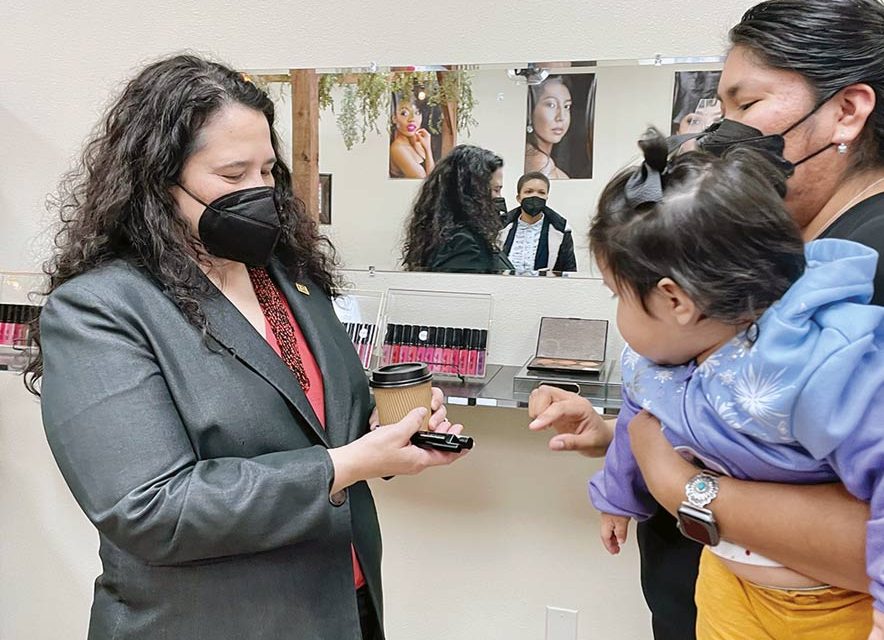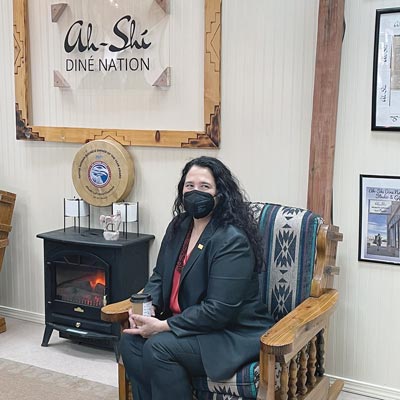
Lack of access to services cited: SBA boss Isabella Guzman visits Nation

Navajo Times | Hannah John
Administrator Isabella Guzman, head of the U.S. Small Business Administration, purchases makeup from Ah-Shí Beauty in Window Rock.
WINDOW ROCK
Isabella Guzman, administrator of the the Small Business administration, visited the Navajo Nation on Tuesday.
Jackson Brossy, SBA office of Native American affairs assistant administrator and member of the Navajo Nation, accompanied Guzman.
‘Nation-to-nation dialogue’
Guzman is the first SBA administrator to visit the Nation. She said it was a unique opportunity and she was honored to visit.
“President Biden’s vision is that we encourage nation-to-nation dialogue and really ensure that we’re having collaboration with tribal leaders in advance of making federal policy,” Guzman said.
“This was an effort to start that collaboration with Navajo Nation,” she said, “I was pleased to meet with President Nez, as well as vice president, to be able to start that dialogue.”

Navajo Times | Hannah John
Administrator Isabella Guzman, head of the U.S. Small Business Administration, speaks with staff at Ah-Shí Beauty about its business concerns.
Guzman and Brossy visited small businesses, such as Ah-Shí Beauty, in the Window Rock area.
Guzman said one of the goals of the visit was to speak with small business owners and to hear directly from them about the challenges they face.
She spoke about what could be done to help them advance their Native-owned businesses through SBA programs.
On the Nation, one of the problems for small business owners is the inaccessibility to SBA or SBDC (small business development center) offices.
These offices are located off the Nation in major cities and border towns such as Phoenix, Gallup and Albuquerque.
However, Guzman said there is a notice-of-funding opportunity for women’s business centers that will be open to all.
She also said the SBA is currently looking for other options to help expand the Nation’s access to these resources.
“Within the president’s budget, we have increased grant opportunities through our office of Native American affairs that Jackson Brossy leads and we are looking to expand support across the nation to ensure that our Native communities have access to SBU resources,” Guzman said.
She said the administration is currently seeing what they can do to expand reach because more options for easy access are needed for Navajo businesses.
“We know we need to meet those businesses where they are, which is, of course, locally and not a long four-hour drive away,” Guzman said.
This week’s visit with the Navajo Nation was only the start of the SBA working with tribal nations and businesses across the United States.
Working with Native businesses
Brossy said in the year 2021, the SBA has done more work with Native American owned businesses than ever before.
A program that helps the SBA communicate with Native American businesses and began under the leadership of Guzman is community navigators.
“Community navigators is a new pilot program brought forward by our SBA and we have thirty-plus Native American partners across the country that operate as either spokes or hubs,” Brossy said.
“We’ve got a giant spoke and hub collection in Alaska and we have a hub in Colorado that connects with 26 Native community development financial institutions,” he said.
The SBA is also taking another look at all current policies to meet the needs of businesses in the present day due to changes within the marketplace and environment.
“We need to continue to encourage those new networks of lenders participating in SBA’s programs as well as look at the policies that prohibit-exist as barriers to businesses that operate on tribal lands to be able to access our program,” Guzman said.
She said “everything is on the table right now” as the SBA continues to go through these policies. They especially want to help and support small entities who have been able to access COVID-19 relief funds through the SBA.
Guzman said a strong ecosystem is vital for small businesses. She said within President Biden’s first year of his term there has been record “economic recovery and historic job creation.” The SBA wants all communities to take advantage of these growth opportunities.
“Based on the conversations I’ve had earlier, there are important assets that, I believe, the Navajo Nation has on the ground – a business incubator, local lenders that can help businesses navigate,” Guzman said.
However, she said the Nation does have its challenges when it comes to small businesses and she believes some of those challenges are the lack of resources and the lack of awareness of resources.
“It’s really our commitment to try and build those bridges and bridge the community so they can connect to capital,” she said. “They can connect to contract, connect to exporting, or any opportunity that’s on the horizon to participate in the bipartisan infrastructure law.”
One of the biggest challenges small businesses on Native nations run into is the lack of access to broadband.
Expanding broadband
To help this need, the bipartisan infrastructure law will provide over $2 billion for broadband expansion to tribal nations across the country.
“Broadband is a force multiplier when it comes to micro enterprises and investments in broadband through the infrastructure investments will be be really critical to leveling that playing field for Navajo-owned businesses as well,” Guzman said.
The lack of access to internet was brought up during a press conference later in the day almost continuously by Guzman and President Jonathan Nez.
“Broadband internet is necessary for Americans to do their jobs,” Nez said, “to participate equally in school learning, health care, to stay connected, and for small businesses to thrive.
“Yet, by one definition, more than 30 million Americans live in areas where there is no broadband infrastructure that provides minimally acceptable speeds,” he said.
“We look forward to working with Administrator Guzman to ensure that our community of small business owners have the resources necessary to thrive,” Nez said.








 Highway 264,
Highway 264, I-40, WB @ Winslow
I-40, WB @ Winslow